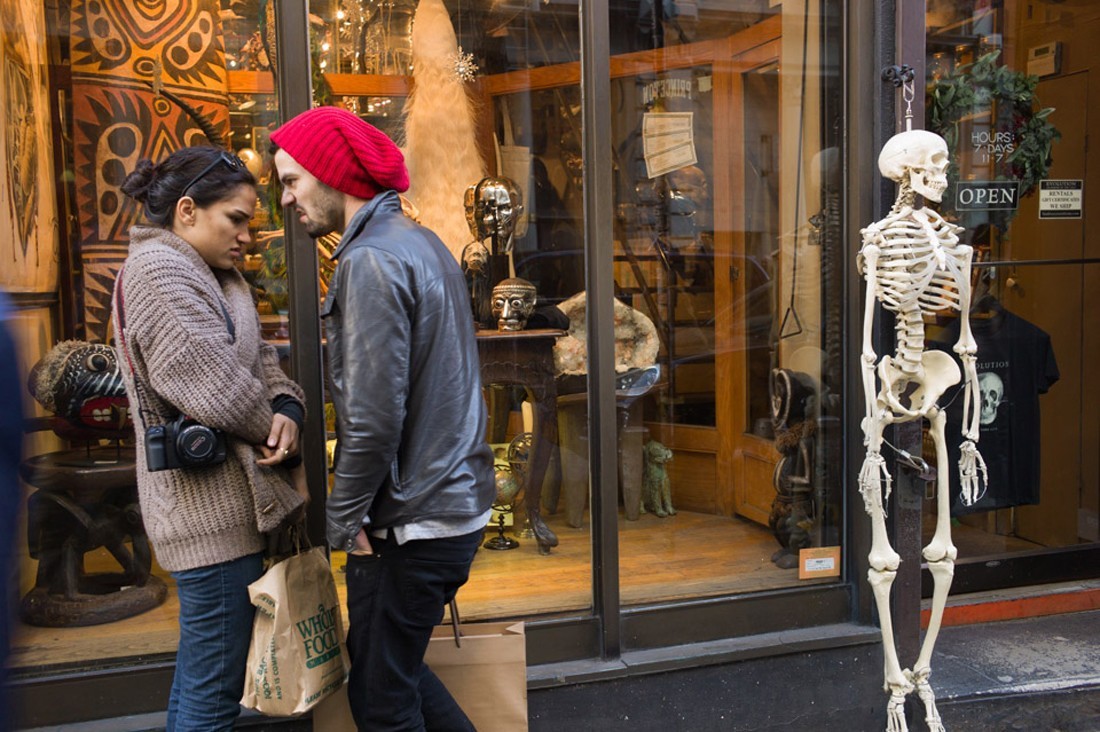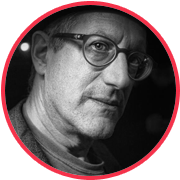
Richard Bram: If You Doubt the Photo at Least a Bit, It Does Not Work

For me it was an outgrowth of becoming a photographer in the first place thirty years ago. I was 32 years old, living in Louisville, Kentucky in the United States and I had lost several business jobs at that point. So when the last regular job ended, I lost my head and decided to be a photographer.
I had to make a living in a hurry, so I became a public relations photographer. The assignment is to make everyone look nice: business presentations, receptions, press conferences, ribbon cuttings, company group shots and things like that.
I would take one at a reception that was not pretty, a bit uncomfortable. I wasn’t looking for it, but something always made me click the shutter. When you take so many happy photos, you must have some edge in there to keep your sanity. Soon, I began to look for outtakes. In 1991, I had my first exhibition of this work and called it Spectators – all the uncomfortable little moments that people do not wish to see. That was the start of my street photography.
{“img”: “/wp-content/uploads/2015/08/Bram_01.jpg”, “text”:”Clown, Kentucky Derby Festival 1991″}
After I moved to London in 1997, I used my camera to come to grips with my new home as I walked. That is when I really began to regularly shoot in the street and my vision as a street photographer grew from this.
Business helped me in photography, without a doubt. Understanding business helped me relate to the needs of my clients and to be comfortable in a business setting as well as on the street.
Mostly I am looking for single images. I do not consciously categorize photos as I’m shooting. The series are a way of organizing them later. A good example of this is the photos from the London Underground, taken over the eleven years I lived there. These were taken as I went about my daily business, allowing chance to bring the photos to me rather than spending days on the Underground shooting all day.
{“img”: “/wp-content/uploads/2015/08/Bram_02.jpg”, “text”:”Angel 1998″}
{“img”: “/wp-content/uploads/2015/08/Bram_03.jpg”, “text”:”Phone 2003″}
I photograph whatever catches my eye. I’m always looking for a significant gesture, a look, or something that shows emotion and human feeling. Only rarely have I shot to a theme; the best example of this is the series “Big Hair and True Love,” made in the early 1990s at street fairs in my then-hometown of Louisville, Kentucky.
{“img”: “/wp-content/uploads/2015/08/Bram_04.jpg”, “text”:”The Great American Hog 1993″}
{“img”: “/wp-content/uploads/2015/08/Bram_05.jpg”, “text”:”Iron Maiden 1993″}
I shoot musicians, because I don’t play an instrument myself, and all my life I have been fascinated by musicians. Being physically close to the instruments, feeling the sound come right out of the wood is a magical experience, and my camera gives me access to do that. Performance is difficult to photograph well. A photo doesn’t have a soundtrack and must capture the emotion of the performers and their music visually.
{“img”: “/wp-content/uploads/2015/08/Bram_06.jpg”, “text”:”Isaac Stern, Louisville, Kentucky 1988″}
{“img”: “/wp-content/uploads/2015/08/Bram_07.jpg”, “text”:”Peter Sheppard Skærved & Aaron Shorr, London 2003″}
At least once a month I’m on the road somewhere, either within the United States or abroad, for personal or business reasons. When I go abroad, it’s most likely to London, Mexico, or Italy. London was my home for 11 years before we moved to New York in 2008 and it may be again. It is a great place to take photographs and I found my voice as a street photographer there.
{“img”: “/wp-content/uploads/2015/08/Bram_08.jpg”, “text”:”Oxford Street, London 1998″}
{“img”: “/wp-content/uploads/2015/08/Bram_09.jpg”, “text”:”Oxford Street, London 2005″}
Mexico, especially Oaxaca in the south of the country, holds a special place in my heart. I love the people, the multi-layered culture, the food, and it has a personal romantic meaning for me: I asked my wife to marry me there on my first visit.
{“img”: “/wp-content/uploads/2015/08/Bram_10.jpg”, “text”:”Lilies, Oaxaca, 1998″}
{“img”: “/wp-content/uploads/2015/08/Bram_11.jpg”, “text”:”The Cookie Lady, Oaxaca, 2001″}
And of course Italy is beautiful. Just being there is like living in an Art History course. The light is wonderful, the people warm and the culture rich. However, I’ll go just about anywhere, given the chance. The world is a big and fascinating place.
{“img”: “/wp-content/uploads/2015/08/Bram_12.jpg”, “text”:”Via Gramsci, Panicale 2002″}
{“img”: “/wp-content/uploads/2015/08/Bram_13.jpg”, “text”:”Foggy Night, Perugia, 2008″}
Regardless of where I live, the way I work and what I shoot doesn’t change. In some ways, it is easier to work on the streets in New York. It is so crowded that no one notices another guy with a camera in a city swarming with tourists. I have recently spent quite a few sunny afternoons working on a couple of corners in SoHo, taking photos very close-up of shoppers and tourists. No one takes any notice other than to occasionally grumble about my standing in the way. The streets themselves are often wider here in New York compared to London, but feel smaller and tighter.
New York and London are also similar in the most important way in terms of street photography: they are dense. The sidewalks are filled with people at all hours. However, the physical structures of the two cities create entirely different moods. London is a low city, rarely more than five or six stories. The streets are generally narrower and more irregular. This gives it a calmer, quieter atmosphere than the tall, vertical grid of Manhattan.
{“img”: “/wp-content/uploads/2015/08/Bram_14.jpg”, “text”:”d’Arblay Street, London 2004″}
{“img”: “/wp-content/uploads/2015/08/Bram_15.jpg”, “text”:”Taxi, Regent St, London 2007″}
On the European continent, there is more resistance to being photographed on the street, especially in France, Germany and some other countries as well. ‘Privacy laws’ have convinced the average person on the street that taking pictures of them is either against the law or something bad or suspicious. This hasn’t stopped me, but I encounter more resistance.
{“img”: “/wp-content/uploads/2015/08/Bram_16.jpg”, “text”:”Place Dauphine, Paris 1999″}
{“img”: “/wp-content/uploads/2015/08/Bram_17.jpg”, “text”:”Mainz, Germany 1996″}
You can’t not be affected by where you’re shooting. The emotional, visual, physical elements around you will always show in the photographs. When I go to someplace that is exotic and very new or different to me, it takes quite a while to get used to surface differences, to get past taking tourist photos of all the new sights and begin to see what is really going on.
{“img”: “/wp-content/uploads/2015/08/Bram_18.jpg”, “text”:”Madrid, 2011″}
{“img”: “/wp-content/uploads/2015/08/Bram_19.jpg”, “text”:”Mtskheta, Georgia 2012″}
Growing up in the USA in the 1950s and 60s, Russia was ‘the other’ – the place that we were supposed to dislike and not go to visit. This made me very curious and to want to go! When an opportunity arose in 1992, I jumped on it. This trip in mid-October 1992 was a seminal experience for me as a photographer. It was the first time that I went somewhere completely new, alone, with no agenda, two cameras, and a lot of film to shoot whatever I felt liked. I spent a week in each city, staying in a private flat with hosts who were kind and very warm but who spoke little English. I got up in the morning, put on my coat and cameras and went out walking all day into the early evening taking photos of everything I saw. It was a particularly interesting time to be there – that peculiar mix of chaos and optimism of the early Yeltsin years. It was very free as well. A few years before or after, I don’t think I would have been able to wander everywhere with a camera. Yes, I would love to go back to see the very different place from the country I saw in that very cold October of 1992.
{“img”: “/wp-content/uploads/2015/08/Bram_20.jpg”, “text”:”Sergeiev Posad 1992″}
{“img”: “/wp-content/uploads/2015/08/Bram_21.jpg”, “text”:”Arbat, 1992″}
{“img”: “/wp-content/uploads/2015/08/Bram_22.jpg”, “text”:”St. Petersburg, 1992″}
Lecturing is rewarding because it’s fun to speak about the work, telling stories around the photographs. Question-and-answer sessions are always challenging, making me think harder about my work and testing my own assumptions. You can’t fake it – the audience will know if you are. If I do not have an answer, I’ll say so. It’s better than dancing around the question like a politician. Teaching is even more difficult as students challenge you constantly. They expect me to know things and want to have clear answers to things that don’t have them.
{“img”: “/wp-content/uploads/2015/08/Bram_23.jpg”, “text”:”Spring Street, SoHo, New York 2011″}
{“img”: “/wp-content/uploads/2015/08/Bram_24.jpg”, “text”:”Pink Coat, Broadway, New York 2013″}
{“img”: “/wp-content/uploads/2015/08/Bram_25.jpg”, “text”:”Nails, SoHo, New York 2011″}
{“img”: “/wp-content/uploads/2015/08/Bram_26.jpg”, “text”:”Sno-Cone, SoHo, New York 2011″}
{“img”: “/wp-content/uploads/2015/08/Bram_27.jpg”, “text”:”Chicken Hat, Fifth Avenue, New York 2010″}
{“img”: “/wp-content/uploads/2015/08/Bram_28.jpg”, “text”:”Fifth Avenue, New York 2014″}
iN-PUBLiC was the first contemporary street photography collective, begun in 2000 by Nick Turpin in London. I was one of the very first members, after Matt Stuart and David Gibson. David saw some of my work in a gallery in early 2001, and thought I would be a good fit. The membership soon quickly grew as word spread via the Internet.
In 2000, If you searched for street photography on the web, (there were no other collectives) all you would find were historic photographs or the work of past masters. iN-PUBLiC wanted to show that it was not a genre of the past but that it was still relevant today.
Perhaps the chief difficulty is editing the photographs. This is the hardest task for any photographer. The American writer William Faulkner said “… you must kill all your darlings.” If you doubt the photo at least a bit, it does not work and out it goes. No amount of excuses will make it do so, no matter how hard you tried or what you hoped would be there.
A great photograph doesn’t have to be a ‘loud’ picture; sometimes a seemingly quiet photograph will show me something that I haven’t seen before, ask me a question that may not have an answer.
{“img”: “/wp-content/uploads/2015/08/Bram_29.jpg”, “text”:”William & Fulton Streets, New York 2012″}
{“img”: “/wp-content/uploads/2015/08/Bram_30.jpg”, “text”:”41st Street, New York 2012″}
{“img”: “/wp-content/uploads/2015/08/Bram_31.jpg”, “text”:”John Street, New York 2011″}
I chose a lot of other jobs earlier in my life, but Photography chose me. I can’t do anything else.
{“img”: “/wp-content/uploads/2015/08/Bram_32.jpg”, “text”:”Times Square, New York 2012″}
{“img”: “/wp-content/uploads/2015/08/Bram_33.jpg”, “text”:”Burger King, Liberty Street, New York 2014″}
{“img”: “/wp-content/uploads/2015/08/Bram_34.jpg”, “text”:”Ice Cream Bars, Sixth Avenue, New York 2014″}
{“img”: “/wp-content/uploads/2015/08/Bram_35.jpg”, “text”:”Maiden Lane, New York 2011″}
{“img”: “/wp-content/uploads/2015/08/Bram_36.jpg”, “text”:”Pet Portrait, Liberty Street, New York 2014″}
{“img”: “/wp-content/uploads/2015/08/Bram_37.jpg”, “text”:”Zuccotti Park, New York 2011″}
{“img”: “/wp-content/uploads/2015/08/Bram_38.jpg”, “text”:”Occupy, Zuccotti Park, New York 2011″}
Do not be easily satisfied. Street photography is a heartbreak. Most of the time you will not come home with a great photo; no one does. What I see most often are lazy ordinary pictures, in focus, exposed properly and with nothing in them at all.
New and best




